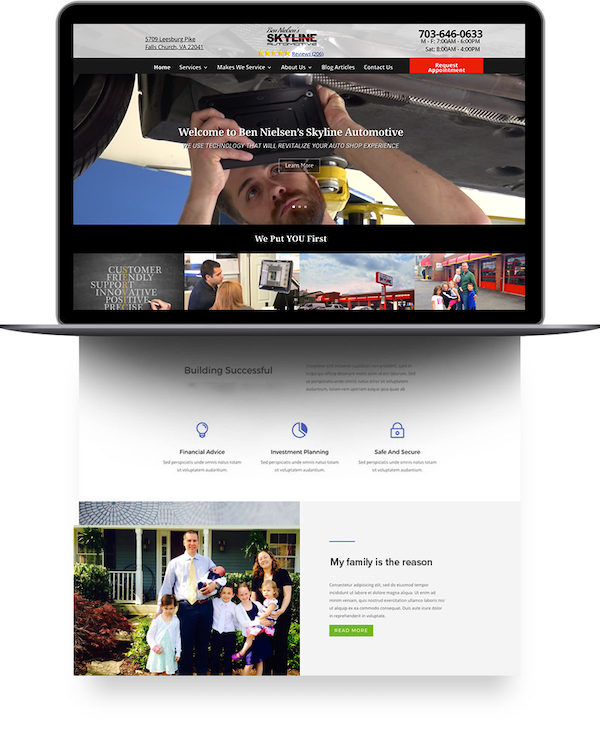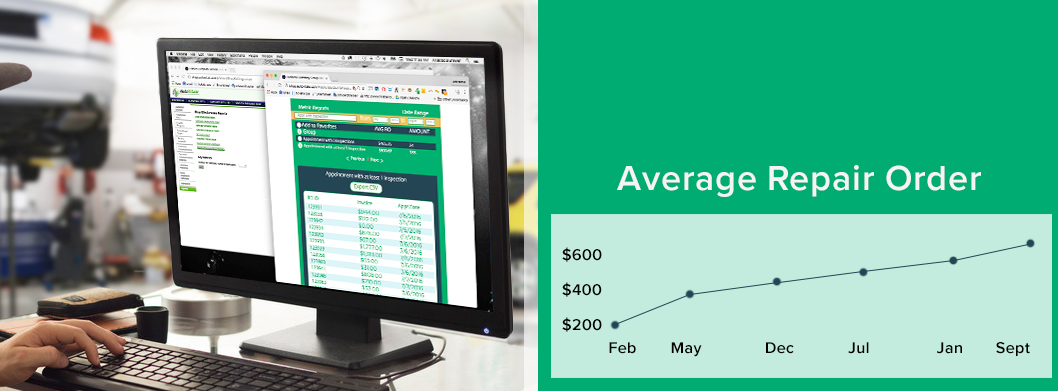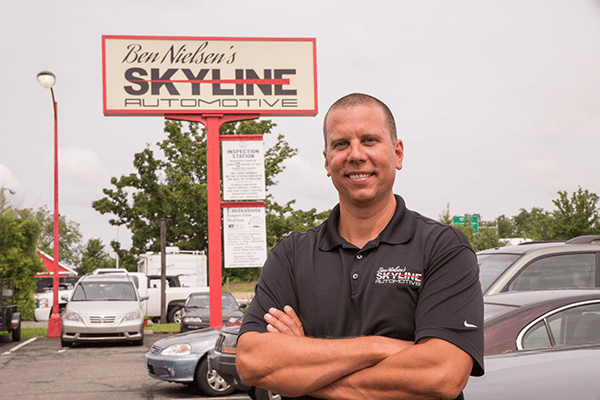We Became a 3 Million Dollar Shop Within Three Years of Opening…
If someone had told me “say you open up Skyline and became a 3 million dollar shop in 10 years, would you be happy?’ I would have said “Oh yeah! That would be the ultimate thing if that happened I wouldn’t know what to do with myself!”
Learn more about how Ben Nielsen met his year 8 projections in the first year of opening his business.

Taking the Leap
Ben Nielsen is a role model in the industry, but business hasn’t always been smooth sailing. Anyone who knows Ben knows he has a vision. If you ask him how something should be, it is clear he has already put a lot of thought into his response. When I set a time to talk with him about his journey to success as a shop owner, I was expecting to hear about revenue goals and strategy. What I didn’t expect was to learn Ben built his business pretty much from scratch, with some luck, some financing, and a lot of fearless determination. Ben describes growing up as being transplanted from Georgia, where he was living with his father, to Virginia where he was dropped off at his mother’s dorm, she had to move off campus to raise him. At an early age, Ben felt the need to provide for himself and his family. Ben quickly got a job at a gas station pumping gas; he then moved from this position to become a mechanic, writing service, and eventually manage the shop as second in command to the owner. He worked at this business for 19 years!
During this time Ben’s life took shape in other ways. He became a husband to a hard-working woman. “Erin was getting her Ph.D. in nursing at the time,” he recalls. They had five children ranging in age from six months to 10 years old. Ben knew he didn’t want to be working six days a week to make ends barely meet for his family, so he decided to open his own business.
We went all in, really. Erin said to me ‘You’re killing yourself over this decision. If you think it’s right, it’s right. What’s the worst that can happen? We might go bankrupt, but they won’t take our kids away.’
Ben has a good relationship with his father-in-law, who mortgaged his house to provide a loan for the business. Ben describes it all in his own words, as follows:
Our plan was conservative in nature, but because of a lot of our financial obligations, we planned out every detail. Our projections used current sales with a little bit of growth.
We had to look at the numbers so closely every day, just to make sure we could make payroll. When it was all said and done we had $1,000 in the bank for the whole family. I had no savings and no backup plans.
The day we opened, we had two mechanics, a service advisor, and me. I inherited that crew with the shop purchase. My plan was to change up some stuff with the current staff. Coming in fresh, my plan was to be at the counter as a service advisor. The biggest reason for making this leap was to spend more time with my kids.
For survival, in the early stages, I needed to be at the counter selling service. But I knew if I continued to do this, I wouldn’t be able to look at the business. Instead, I would be sucked into it. Also, I wouldn’t be able to meet my goal of spending more time at home.
The Yes Mentality
In the first year, we did very little marketing. We worked hard on word-of-mouth advertising. We didn’t have the budget for marketing at first, so we focused on being active in the community. A lot of people lived 20-30 minutes away, but they started hearing about where we are and traveled to get here.
People I had taken care of before would say, “you’re so far away.” I wanted to help them when they wanted to bring their car to me; I wanted to say yes! So I started the Nielsen Now pick-up and drop-off service. They said, “wow, you’d do that?” Of course, we had to. This started to develop very quickly. First, we were winging it, then it started to fall into place as we coordinated and planned out logistics. This was the first thing we did to set ourselves apart, and no one really did this well. By listening to our customers, we wanted to give them what they needed. This mentality eventually led us to open a body shop.
People would say they didn’t know where to go for their bodywork, and that they wanted to bring their car to us. It was a big need for our customers.
I knew from the beginning it was important to provide consistent work and results. The experience should be the same every time for every customer. The workflow should be the same for every tech on every vehicle. This way I can take care of my customers and provide structure and training to my employees.
The Digital Journey
I started a courtesy check. We started with a paper form that was very generic and looked like everyone else’s out there with red, green, and yellow boxes. This was a way to provide quality assurance in my process. We established the check to make sure customers were getting a consistent experience and to have new employees learn a system that gives consistency to the way we work on cars. The quality of repair has to meet a standard. I was aware of how quickly you can lose a customer if it doesn’t meet that standard. At this time, software and digital solutions were off my radar. I soon learned about these solutions through ATI. A lot of different names came up and I looked into them. AutoVitals was different than anything we had seen.
We needed numerous solutions. It wasn’t just about digital inspections, it was also about our need for retention campaigns and a website with an SEO strategy for getting new customers. When I acquired the business, there was no strategy; there was some money everywhere with no connectivity.
The things we were certain we had to do well:
- Do quality work.
- Have an Inspection (digital if possible).
- Implement a marketing strategy.
The courtesy inspections on paper were time-consuming, and I knew there had to be a better way. AutoVitals offered all-in-one products. We thought there would be more accountability with a company you’re all in with, as opposed to using different vendors for products.

"When we had fully implemented AutoVitals, our ARO had tripled in 18 months, going from $187 to $593."
Digital Implementation
It’s change. Nobody likes change. We had the same experience as the general statements you hear a lot, with techs trying to get used to it mainly. The guys believe in me and if I say we are doing something, they will put forth their best effort. There wasn’t pushback as in, “we won’t do this,” but there was a learning curve.
I had to be clear with expectations and processes. My expectations were based on AutoVitals’ best practices, starting with 60% of all vehicles getting a vehicle inspection. The results were up and down, and it really depended on how much we talked about it. We would review AutoVitals data in weekly meetings.
At that time, we were trying to put a lot of new things in place at once, which made it pretty chaotic. It was a six-month transition to digital. I don’t know if I would have changed it; I didn’t want to get personally involved in implementation. I set a standard, required accountability, and rolled with it. I didn’t want to get sucked into the shop. I can’t say if I wish I could have done it differently. I did it this way.
Results
The customer reaction was awesome. The feedback from the service advisors was incredible. They used it as a sales tool.
The tickets sometimes sold themselves before the service advisor made the call the customer would respond and say “do the job!”
AutoVitals is a well-rounded product when it comes to the way we communicate with customers, from our presence on the web which helps us get new customers, to the way we communicate with them while they’re in the shop, to the way we retain them. We need a well-rounded and consistent way to reach customers.
I spend an incredible amount of time on reporting. I look at everything weekly as a whole. If there is something I’m concerned about, I start looking at it daily.
One of the biggest things that sets AutoVitals apart from other companies is the amount of data you get. Speaking from experience in using other vendors, AutoVitals gives you the most useful information.
ATI gave me a lot of structure. It helps me stay focused and in the mindset of accountability. You always get something out of a class, whether it’s the conversation with classmates or the coaches. Your brain is in a different mode.

“We had experienced AutoVitals before, and we wanted to go back to that."
The Switch For Digital Inspections
From a transition perspective, the most cumbersome thing was the digital inspections. [other DVI company] from the outset said, “we don’t have as much data as AutoVitals does.“ At the time I thought, “well, AutoVitals has so much data, I don’t really need all of it, reports are reports.” I just need to know the core numbers and stats. With this perception, I really lost hold of my ability to manage the guys weekly. It was not a smooth transition.
When you look at the ticket price drop we incurred, I think it’s less how the inspection looked and more that we weren’t talking about it anymore. The data I received from AutoVitals would give me all the information to lead my weekly meetings; without that data, we didn’t talk about it, we didn’t look at it, and we watched the average ticket fall significantly, like over $80.00, which is a big deal when you have 100 cars per week. I wasn’t ever thrilled with the product; I tried to get the data I needed to run the business, and I couldn’t get it.
The Switch For Website
The website performance was the leading reason we knew we had to make a change. We had experienced AutoVitals before, and we wanted to go back to that. You get information from salespeople, so it’s hard to tell what you’re going to get. You get a pitch. It was clear there are two very different SEO strategies and different approaches to web presence between the two companies.
I found that even with a single vendor, specializing in a single product, there was no accountability; within six months the data showed it was worse. Our placement was not good in Google, and we lost a lot of keyword rankings. Neither of these strategies is inherently wrong, but for me, in my location, it was very apparent from raw data that the AutoVitals strategy works far better than the other one. It may not be this way for everyone, but it was for me.
The Switch for Workflow
Before going digital Ben recalls that they had a paper form of courtesy inspections, it was hard to manage and looking back now, completely antiquated. With the digital format we are used to, it’s so apparent that it was ineffective, so I don’t have an opinion of it working at all. Ben went digital with AutoVitals to begin with then switched to [other provider]. He recalls knowing that the results wouldn’t be the same but was shocked at how different it was.
When I asked Ben about workflow with [other provider] he said “I think they have a workflow tool, but I wasn’t confident it worked.”
If it worked it was generic. Definitely, the workflow management abilities through AutoVitals are certainly better than anybody else’s. There are so many other layers of dysfunction with [other provider] that we never got to the point that we were really even using it. I couldn’t tell what works and what does not work because it was all a mess. They say they have a solution, but I never experienced it.
The Switch for CRM
I don’t even know if you could call it a CRM we started a folder system, and we would put recommended services in a folder and organize it by week. So if someone had a job, we would put it in a folder and wait 30 days, then pull it out and manually make calls. In the calls, we would remind them of the recommended service due, it was ineffective, and we couldn’t get a hold of people. We couldn’t connect with the people because we got so few appointments.
With The Other Guys
When we acquired the business, they were using demand force, so we stopped using it when we signed up with AutoVitals early on. When we left AutoVitals, a 20 group friend suggested we try “hire Frederick” which we did, this product did not work for us and was not aligned with our goals. We got terrible open rates and less than a .05% action rate if they did open it. Additionally, we tried mechanic net. There were parts of this that we liked and very heavy downsides as well. They were slow to implement any change to our system, if something needed to be changed, we were looking at 2 weeks downtime minimum. We probably didn’t give them long enough to make a sound appraisal of their services, but we couldn’t keep waiting.

“There are companies in any business that want to continue to grow their technology and their business, and AutoVitals is one of them."
Ben and Erin put their business back in the care of AutoVitals in January 2018. Ben said, “We want to partner with a company that will continue to develop their product and stay ahead of the industry, and we decided AutoVitals was this company.” He went on to explain the strongest case for AutoVitals over the competition was web performance. We saw a significant change in web presence that was staggering and undeniable. There were other very big problems to look at too, he recalls “having our ARO drop and not being able to pinpoint where hurt the business and my ability to manage it a lot too.” Upon becoming “new” customers with AutoVitals again, they were pleased to discover a new CRM suite that had been implemented while they were gone. Ben said, “I couldn’t believe the response rate, people who had sold the cars were replying to tell us this. I even had a customer who wasn’t happy with her previous service and told me that in response to a campaign, I was able to call her and save that customer.
After the six-month experiment, we decided to switch back to AutoVitals as our single-vendor solution, and we haven’t looked back. AutoVitals has implemented a lot of new features which align with where we want our business to go. We are back on track and have new goals that we can definitely reach with AutoVitals.
Future Goals
Relentless execution is my story. We have to be so consistent with execution and expectations. A product like AutoVitals is going to help me open more shops and be consistent with all of them. When I’m working at our body shop, I can get a real-life look at what’s going on in my shop through AutoVitals. Many factors I can check on without being at the shop are absolutely priceless. This isn’t about the money, it’s about the potential, knowing you’re maximizing potential every day. The results we have had are amazing, but they show we can do so much more. Our plan is to have the business create an income for the rest of our lives.
AutoVitals’ commitment to making sure the product continues to get stronger and lead the industry is so important. For us, we are in growth mode, and we have to continue to work at driving customers to our door. That’s why we went back to AutoVitals. They have an SEO strategy that really works for me. Once a customer is in the door, we can do the rest. AutoVitals delivers all the data needed to constantly improve and maximize potential.
Future of the Industry
“We will rise to meet the expectations of tomorrow and do the best we can today.”
I’m not as concerned about the industry falling apart because of self-driving cars.
Consumers are going to make decisions based on wants and needs. I don’t foresee in my children’s lifetimes that this industry is going to go away. It’s going to change, and we are going to continue to evolve with it. That’s why we build relationships with people like AutoVitals and ATI, people who are focused on the industry and what may be happening down the road, but with solutions for what’s happening right now. In the future, we are going to continue to have the ‘yes’ mentality, period.
If the mechanical industry changes so much that cars don’t break, we will end up having more of a focus on fixing them at the body shop when they run into each other.
Diversity is a strength that will continue to meet today’s problems, whatever that means. If we have to turn our auto repair shop into a shop that’s working on lawnmowers, we will figure it out. We are going to evolve with whatever comes, bottom line. We are confident of our ability to do so because of the companies we partner with, like ATI and AutoVitals. Ben and Erin’s children currently range from ages 4-14. Erin and Ben are true co-owners in the shop, both of them can manage anything that comes at them, but just like raising a family, it works better as a team.